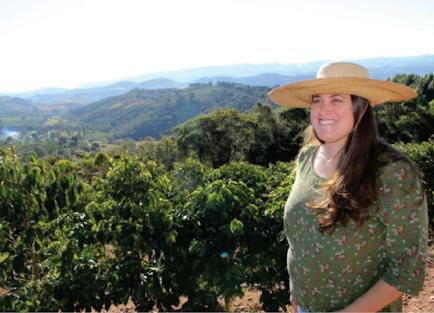Preliminary schedule:
- Mon, 28th Oct – arrival Sao Paulo
- Tue, 29th Oct – drive to Varginha, visit farms
- Wed, 30th Oct – Cup
- Thu, 31st Oct – recup, visit farms
- Fri, 1st Nov – Competition cupping (Apas cup)
- Sat, 2nd Nov – Competition cupping (Apas cup)
- Sun, 3rd Nov – depart
It feels like Brazilian coffees are the underdogs of the Speciality coffee industry, yet they also play an important role in making coffee accessible to a broader range of coffee drinkers. And they would surprise most, if we were given more opportunity to pay the same attention at every stage of production as you see in countries like Kenya for example. Our goal with the Brazilian coffees we buy is to show both what Brazil has to offer and to deliver a coffee that is very drinkable!
Brazil has a lot of coffee to choose from, and economies of scale on large flat farms make Brazilian coffees good value for money. However not all farmers are working on that scale, and not all large-scale farmers can consistently produce good quality.
We work a little differently in Brazil. We don’t go in each harvest and select only the top scoring coffees on the table, rather we choose to buy consistently from the same producers, those who are committed to improving quality. With this long-term commitment we can ask more of the producers including selective picking and experimental processing. Our aim is to create a new category of Brazilian coffee: consistently high quality volume and micro-lots that can stand alone, not just the base coffees for your blend.
Apas Cup
A competition like this is a way of incentivising farmers and paying them great premiums for great coffees. It also gives us the opportunity to meet and get to know the farmers in that specific area, and explore the true potential there. The farmers also appreciate meeting roasters, it makes them feel connected to their markets, and valued for their hard work and investment.
Apas Cup began last year (2018) and is organised by the Apas cooperative, which has 69 farming members, and the exporter we work with in Brazil. Brazilian coffees are the underdogs of the specialty coffee industry, yet they also play an important role in making coffee accessible to a broader range of coffee drinkers. People have an image of large industrialized and flat farms, but there are many small scale farmers. For the Apas members, farms from 2.5 hectares to 7 hectares (with roughly half being planted with coffee) are typcial.
I spoke to Joanne Berry, our head of sourcing, about origin competitions and how are they different from regular cupping trips:
“They are a platform to discover unique coffees and give producers the opportunity to aim at their best possible production knowing they will have a market, by NA committing to purchase at a predetermined price and volume. The farmers benefit from participating in this kind of competition as they get exposure to what we value in the cup (we as in NA and our customers who come with us). Farmers seldom get a real opportunity to interact directly with roasters. This competition is also a good opportunity for roasters to be exposed to coffees from a particular area of a country. Particularly in Brazil, these are small producers who ordinarily would get lost in the scope of the market there. “
Kenji Kojima from Fuglen Coffee Roasters Tokyo came with us to Brazil for the Apas cup in 2018:
–Why did you decide to come to the Apas competition?
–It was my very first trip to Brazil and I thought I could meet great and passionate coffee and producers.
– How was your experience?
– It blew my mind! I’ve never tasted such juicy flavour from Brazilian coffee before.
– What was the best part?
– Announcement day. It was really exciting and happy to see when the producers got the results.
– What did your learn / what is your main takeaway?
– Before that, coffee from Brazil for me was chocolatey, low acidity, mild and creamy. But actually I learned it’s not always the case. In fact what I tasted there was the opposite.
– Why do you think it’s important for farmers/producers to have access to these type of events?
– It gives them an opportunity to meet roasters who want to buy great coffee and they learn what kind of profile roasters are seeking. And I think it makes them proud to be a producer.
– Why is it good for roasters to be able to come and judge at these events?
–You will have very different experience, participating in an event with producers compared to cupping coffee in a lab or at your roastery. It made me realize, when I buy coffee I involve someone’s life, someone’s effort.

Last year’s Apas Cup winner was Adriana de Barros Rodrigues (pictured above) from Sítio São Francisco. “The experience was unique. I received the recognition and appreciation for my entire work. I just have to thank the partners involved for the opportunity! Winning the competition brought me the certainty that we are on the right track, striving for excellence through quality, not only in post-harvest processes, but in all processes, and gave me the certainty that all our hard work was worth it“.
Want to be a judge?
If you want to travel with us to origin and judge the Apas Competition, get in touch with joanne@nordicapproach.no